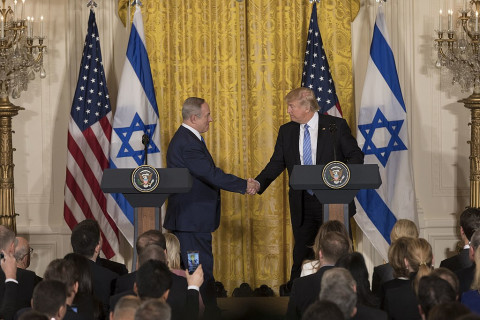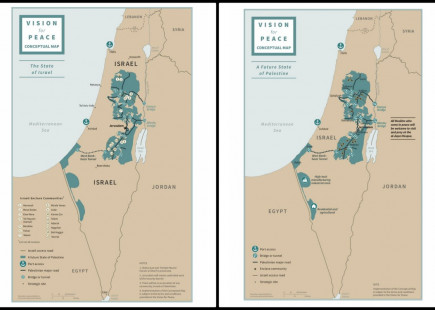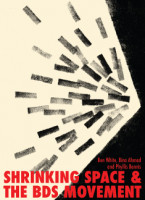Trump's Middle East 'Peace Plan' Is a Step Towards Institutionalising Apartheid The ‘deal of the century’ demands that Palestinians officially accept that Israel has no responsibility for its inaugural act of ethnic cleansing and all brutalities on Palestinians since.
Regions
The Trump Peace Plan unveiled on January 28, represents the formal institutionalisation of an Israeli apartheid state. Most other governments – regardless of whether they enthusiastically or more cautiously welcomed the Plan or even criticised or rejected it – have invariably stated that, given the absence of the Palestinian side in the process of forming this Plan, a negotiated ‘final settlement’ is still needed.

The White House from Washington, DC [Public domain]
This completely misses the point. What has happened is the logical culmination of a process of US unilateralism that began with the Trump presidency which declared undivided Jerusalem as Israel’s capital; endorsed the permanent annexation of the Golan Heights; cut off funding to the Palestinians; and now put forward this new plan.
This is the ‘final settlement’. It is not a proposal put forward for discussion and substantive changes through further negotiation but an ultimatum.
To grasp what the real purpose of this plan is and also who are its intended audiences – certainly not the leadership of the Palestinian National Authority (PNA) which is why they were deliberately excluded in the first place – the plan itself must be dissected. It is followed by a brief survey of certain official government responses including that of India. This is because this plan, through the creation of irreversible new ‘facts on the ground’, also aims to dramatically deepen Palestine’s international isolation.
The plan
The Trump plan declared that the main illegal Israeli settlements that are in the West Bank (minus a few outliers) must now become permanent and, sure enough, within hours of Washington saying this, Netanyahu announced the formal annexation of 131 Jewish settlements. What will soon follow is the annexation of the Jordan River valley of some 80,000 hectares of agricultural land where some 65,000 Palestinians and 11,000 illegal Israelis settlers currently live.
During the course of its longstanding occupation of the West Bank, over 70% of its water resources were routinely diverted to the settlements and to Israel behind the Wall. This process will be further exacerbated in the valley so as to force out the Palestinian farming families earning their livelihood there.
According to the new plan the Palestinians will get, area-wise. a substantially reduced set of separate Bantustans connected by roads, bridges and tunnels (also to Gaza) but with no security control over the new boundaries of this truncated and internally fragmented ‘Swiss cheese’ of a so-called state. This entity will be fully de-militarised with its air space also fully under Israeli military control.

The Wire (India)
The Palestinian ‘Right of Return’ – incidentally a fundamental human right – to previous homes/lands for Palestinians expelled and displaced since 1948 must be renounced. It is crucial to understand why this is so pernicious a condition. This ROR has a practical dimension and a political-symbolic one.
The former is negotiable, namely how many actually do or want to return or are given compensation and rights of residency elsewhere.
But the latter dimension is far more important and must be upheld. There can be no future establishment of an enduring peace or the transformation of the existing hostile relationship between Israel and Palestinians unless Israel admits that it’s ethnic cleansing of 1948 was a great injustice and wrong.
There could have been no new beginning between Germany and Israel and Jewry if the former did not apologise and accept its moral guilt for the Holocaust. Similarly, South African apartheid had to be recognised as fundamentally unjust and immoral and needed to be ended before relations between whites and non-whites could start on a new footing.
The same holds true for future relations between Palestinians and Israeli Jews. Moreover, this plan also calls for the Palestinian side to drop all war crimes investigations against Israel including withdrawing those lodged in the International Criminal Court. So this ‘Deal of the Century’, which actually is a collusion between the US and the mainstream political parties of Israel, demands acceptance of not only its apartheid rule but that Palestinians officially acknowledge not only that Israel has no responsibility for its inaugural act of ethnic cleansing that created Israel in the first place, but for all the brutalities that have been imposed on the Palestinians since.
The ‘twist’ in this plan is that there will be a four year waiting and a probation period for the Palestinian leadership to accept and come to terms with this new reality. Israel will freeze further annexations during this period provided the Palestinians ‘behave themselves’ i.e., pose no ‘security threat’ to Israel which will be the sole arbiter of whether or not Palestinians have behaved properly.
In return for this complete surrender and after the end of this period, Trump has promised to organise $50 billion for Palestinian development no doubt with the support of other allies in the Middle East and Europe who can be expected to fall in line with the new arrangement once the Palestinian leadership itself falls into line. Otherwise, there will be no Palestinian state, period.
During these four years, more pressure will be put on both the Palestinians and its ostensible allies among Arab states while diplomatic criticism from other governments can be expected to fade further from its existing levels of already feeble inconsequences. Of course, the divide between Hamas and Fatah must be retained.
For the former in Gaza, more punishment for this most densely populated and impoverished region but also the sustenance of its status as the world’s largest open-air prison subject to regularised aerial bombing and shelling. For Fatah or other aspiring leaders in the West Bank, accepting the transition from being since Oslo, subcontractors of the occupation in an economy substantially fuelled by international aid, and having some limited degree of autonomy to carry out municipal rule and line your own pockets through corruption, to now becoming mere puppets in a new dispensation. Even apartheid rule requires local collaborators.
Audiences and responses
Trump’s plan which has long been in the making, apart from what it has done for the more extreme forms of Israeli Zionism, has really had three other targets in mind. One, of course, is the anticipated political fallout in the US itself. The second pertains to the Middle East, North Africa (MENA) region and especially its key actual or potential allies. The third is its European, NATO and other strategic and tactical allies among which India can certainly be counted.
Within the US this plan will have decisively shifted the goalposts. It puts an end to the waffling by previous US administrations, whether Republicans or Democrats, willing to mouth pieties about respecting international law and recognising that Palestine had a case while deliberately being blind to Israeli transgressions and continuing to give it material, military and diplomatic-political support whenever it really mattered.
Sanders and Warren the two candidates in the Democratic primaries have voiced their rejection but the mainstream in the Democratic Party may voice reservations about whether this will work but will not buck the new political wisdom in Israel itself and will eventually accommodate itself to this plan as it already has to all the other unilateral steps taken by Trump regarding Jerusalem and the Golan Heights. The safer option currently is to concentrate on the upcoming elections, talk about Trump diverting attention from the impeachment proceedings and keep talking about Israeli security needs. Biden, the Democrat frontrunner, in his response to Trump, failed to make any reference to the Palestinians.
In Israel, the claim that this plan was mainly meant to be a diversion needed by Netanyahu given his bribery charges, does not really hold water. Washington can count on his rivals like Gantz and the other parties in whatever ruling coalition finally emerges after the March elections, to fully endorse what has been done. It is noticeable that Egypt, Saudi Arabia, Oman, Bahrain and the UAE have been careful not to condemn the plan and have even suggested that the Palestinians might take it into consideration in their negotiations.
For formality’s sake, these countries have also gone along with the Arab League’s latest joint resolution rejecting the deal. Egypt values its close relationship with the US (a huge donor) and after its separate Peace treaty with Israel has had no quarrel with it. The US knows that it is Iran, not Israel that most worries these Arab states and that the gulf between these princely and dictatorial regimes and the Arab street on the Israel-Palestine issue has always been very wide. There is even the possibility that over the next four years, as mentioned earlier, these governments, that also bankroll the Palestinian National Authority (PNA) and Fatah, could also play their part in pushing the latter to accept what now seems unacceptable.
Britain’s Boris Johnson, as expected, has welcomed the plan while France has also done so saying it will study it carefully. Russia, needing to balance between two friendships with Iran and Israel respectively, has also taken the easy way out saying it needs to study the plan leaving it to Germany, the other main heavyweight in Europe, to somewhat surprisingly, strike a more sceptical note doubting that it can be the basis for a sustained peace.
A number of politicians belonging to the centre and rightwing parties have been aggressively critical of it. Nonetheless, the German government is buying time saying its official position will come after consultations with European partners.
So where does India fit in? Ever since the Congress government of Rao established full diplomatic relations with Israel, the Indian stance has been one of having ever closer cooperation at various levels with Israel while paying lip service and money to the Palestinian cause. With the advent of the first and subsequent NDA governments, the Sangh’s ideological admiration for Zionism has led it to go further. Where once a positive Indian vote for UN resolutions in favour of Palestine was de rigeur, now there has been the occasional abstention.
It was during Vajpayee’s time that there was the first-ever visit of a sitting Israeli Premier, Ariel Sharon. Modi was the first Indian premier to officially visit Israel. New Delhi’s response this time was more timid than that of Germany abandoning even the formality of not annoying the PNA leadership by stating that the two sides “engage with each other including on the recent proposal put forward by the United States.” Given that this was preceded by a three-year silence by India on Trump’s declaration that undivided Jerusalem must be Israel’s capital, no one should be surprised at this implicit endorsement of apartheid. After all, why condemn that which happens abroad if something similar is what is desired on the home front!
As for Palestine?
As for the Palestinians, Mahmud Abbas has announced that the PNA has withdrawn from the Oslo Accords – which in any meaningful sense was already long dead – and will cut its security ties with Israel and the US. It remains to be seen what will follow from this.
Does Fatah now say Israel must do all internal policing and local political decision-making regarding everyday concerns thereby voluntarily giving up whatever powers and authority it currently has? Will it give up its call for a two-state solution and now talk of full and equal democratic rights for all in a one state Israel? Will it seriously seek unity and share authority with Hamas when in the past it has colluded with the US and Israel to deny Hamas the fruits of election victory in the West Bank, and when this will alienate many European governments which it might still want for material and political-diplomatic reasons? Past experience does not suggest any such dramatic stiffening of the spine of the current PNA leadership.
The great tragedy of a remarkable people – the Palestinians – is that they have never had the kind of leadership they have deserved. But it is their indomitable will and their relentless pursuit of justice across generation after generation that continues to prevent forces far more powerful from finishing off for good this amazing Palestinian struggle. What then might be the way forward in these dark times? Some comments here may not be entirely amiss.
First, the only realistic longer-term goal is for a fully democratised one state solution with equal rights for all its citizens regardless of religious or ethnic affiliation.
Second, a new and younger and more united leadership, which recognises how much of a dead-end both Fatah and Hamas have been, must emerge. This may not be that far off.
Third, further democratise the internal structure of the Palestine Legislative Council by giving due and substantial representation to those chosen by Palestinian refugees outside of the occupied territories (OTs) and in this way forge a much wider and deeper unity that will be far more effective both within and without the OTs.
Fourth, Palestinian success cannot be separated from the question of what happens in Iran and the Arab world as a whole. This region remains dominated by one or the other form of anti-democratic and dictatorial rule. The overthrow of one significant power in the region and its replacement by an enduring democratic order will dramatically reignite the prospects of achieving greater justice for the Palestinians themselves and for further democratic upheaval in the region. Neither Israel nor the US can stop this once it reaches a critical level of intensity. These two struggles must be connected. For too long the Palestinian leadership has taken the failed route of ignoring this wider democratic struggle so as to secure largesse and feeble political-diplomatic support from repressive regimes.
Fifth, pursue a completely non-violent resistance to the brutalities of Israel. This may reduce but it will not stop Israeli brutalities. However, it will also generate much wider support among the world’s ordinary public to carry out the Boycott, Divestment and Sanctions (BDS) campaign and put much more pressure on their respective governments to penalise and censure Israel in various ways. In the longer run, Israel fears this more than any armed resistance.
Nelson Mandela was once asked when he knew that apartheid’s end was forthcoming. His answer needs to be treasured. He said that he knew this would happen once he and others in the anti-apartheid struggle had realised that they had caught the ‘moral imagination of enough people’. He did not say all the people or most of the people but only of ‘enough’. As long as the Palestinian people continue to remain unbowed and intransigent in their struggle for justice, despite all betrayals by leaders and governments, that time will come!
This article was first published by The Wire.


